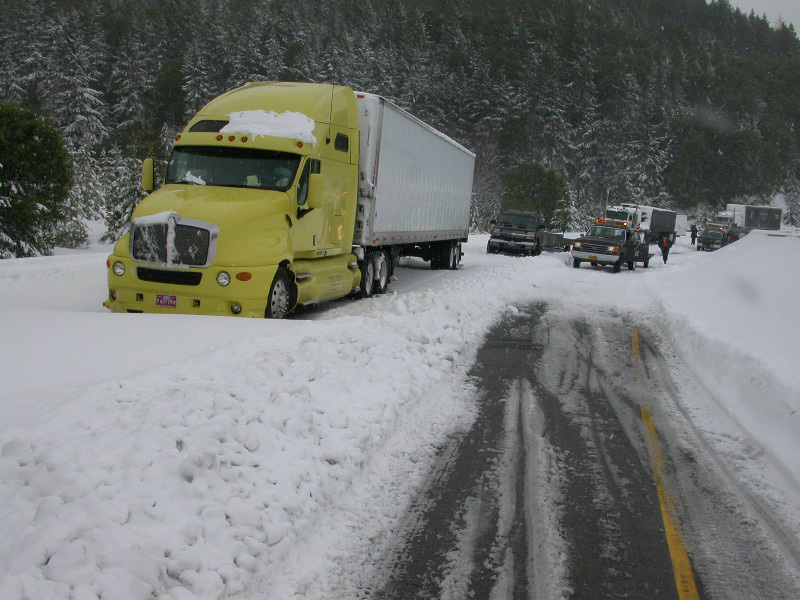Resources > Winter Survival Tips for Truck Drivers 2024
Winter Survival Tips for Truck Drivers 2024

Winter semi-truck accident on a snow covered highway | Credit: Flickr
Introduction
As winter sets in, the challenges of cold weather driving become all too real for truck drivers. From unpredictable storms to mechanical issues, the risks of being stranded in frigid conditions are high. Whether you’re navigating icy highways in Manitoba or the snow-packed roads of the Trans-Labrador Highway, preparation is the key to staying safe.
The Reality of Winter Weather
Severe winter storms, like the polar vortex of December 2022, demonstrate how extreme weather can catch even the most experienced drivers off guard. With record-breaking snowfall and freezing temperatures, over 100 lives were lost during that storm alone. For truck drivers, being stranded during such conditions can quickly escalate into a life-threatening situation.
If you’re caught in the cold, hypothermia and frostbite are your greatest enemies. Hypothermia occurs when your body loses heat faster than it can produce it, leading to confusion, clumsiness, and even unconsciousness. Frostbite, on the other hand, can damage exposed skin and underlying tissues, especially on your fingers, toes, ears, and nose.
Suzanne’s Lesson on the Road
Veteran truckers, like Suzanne Kynes, know the importance of being prepared. Early in her career, Suzanne’s truck broke down in sub-zero temperatures near Edmonton, Alberta. Without the proper supplies, she barely made it through the night until a passing truck driver rescued her. Her advice? Always carry emergency gear like candles, warm clothing, heat packs, and non-perishable food.
Preparing Your Truck for Winter
Your truck’s reliability is your first line of defense against winter’s challenges. Cold weather impacts every system, from the engine to the fuel and electrical components. Here are some critical steps to winterize your vehicle:
- Batteries:
Cold temperatures reduce battery efficiency, cutting their power output significantly. Have your batteries tested before winter hits and replace any weak ones. Clean and tighten battery connections, and consider using batteries with high cold cranking amps (CCA) if you frequently start and stop in frigid conditions. - Fuel System:
Diesel fuel can gel in extreme cold, rendering your engine inoperable. Use winter-grade fuel and anti-gel additives, and check for water contamination in the fuel, which can freeze and clog lines or filters. - Tires:
Cold air contracts, reducing tire pressure by about 2 PSI for every 10°F drop in temperature. Regularly check your tire pressure to ensure optimal traction and safety. - Charging System:
The alternator works harder in winter due to increased electrical loads from heaters and lights. Inspect belts, brackets, and cables for wear, and clean any corroded connections.
What to Put in an Emergency Kit
Even with a well-prepared truck, emergencies happen. Build a winter survival kit to keep you safe and comfortable if you’re stranded. Here’s what veteran drivers recommend:
- Clothing and Warmth:
Insulated coveralls, multiple thick socks, gloves, a toque, a ski mask/balaclava, and a foil emergency blanket. - Heat and Light:
Candles, battery-operated lanterns, hand/feet/body warmers, fuel cans, a lighter, and rechargeable flashlights. - Food and Water:
Lots of water, protein bars, canned goods, nuts, dried food that can be rehydrated, and a pot to heat food or melt snow. - Tools:
A small shovel, basic utensils, a can opener, and extra phone batteries or power bricks. Usual tools you would bring in your trailer can also prove helpful.
General Tips for Staying Safe
- Never let your fuel tank drop below half.
- Avoid venturing outside the cab unless absolutely necessary.
- Monitor weather conditions before starting your trip and be ready to delay your departure if necessary.
- Keep a window slightly cracked if the engine is running to prevent carbon monoxide poisoning.
- Stay active and move to generate body heat and stay alert.
- Always keep an eye out for closures on your route.
Conclusion
Winter driving demands respect and preparation. By winterizing your truck and equipping yourself with the right gear, you’ll be ready to face whatever the season throws at you. Remember, your safety is always the top priority—don’t take unnecessary risks on icy roads or in freezing conditions.
